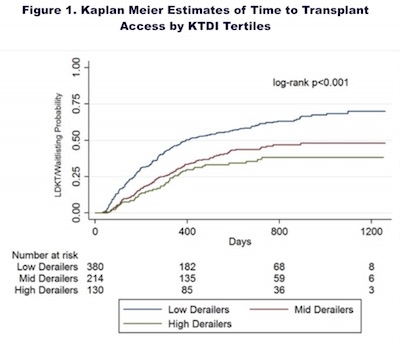Development and Validation of a Socioeconomic Kidney Transplant Derailers Index (KTDI)
1UCLA, Los Angeles, CA
2Terasaki Research Institute, Los Angeles, CA
3Univ. of Rhode Island, Kingston, RI.
Meeting: 2018 American Transplant Congress
Abstract number: 156
Keywords: Kidney transplantation
Session Information
Session Name: Concurrent Session: Non-Organ Specific: Disparities to Outcome and Access to Healthcare
Session Type: Concurrent Session
Date: Sunday, June 3, 2018
Session Time: 4:30pm-6:00pm
 Presentation Time: 5:18pm-5:30pm
Presentation Time: 5:18pm-5:30pm
Location: Room 4C-4
Transplant evaluation requires an assessment of socioeconomic challenges patients face that may derail them from obtaining a kidney transplant (KT). We developed and validated a new, single score Kidney Transplant Derailers Index (KTDI).
Data were obtained from dialysis patients in Missouri (n=561) and patients presenting for KT evaluation in California (n=724). These patients were White (45%), Black (32%), and Hispanic (22%). Eight potential KT derailers were measured: financial insecurity, educational attainment, type of employment, type of health insurance, perception of neighborhood safety, access to a vehicle, having a washer/dryer at home and social support.
Item response theory models were used to estimate KTDI scores (T-score, mean = 50 and SD = 10) and determine which derailers best discriminated between underlying levels of socioeconomic status. Construct validity was examined with associations between the KTDI and zip-code level socioeconomic indicators from the US census, including % in poverty and % without health insurance. For patients who presented for KT (n=724), we also determined whether the KTDI score was predictive of time to transplant access.
Greater financial insecurity, low educational attainment, not having full-time employment, having Medicaid, not having private insurance, and no access to a vehicle were the most discriminating indicators. KTDI scores ranged from 34.2 to 63.1 (Mean: 50; higher scores indicate more derailers). Black patients and those with worse health had higher scores.
There were positive associations between KTDI scores and % in poverty in the patient's zip code (γ = 0.26, SE = 0.03, p<0.001) and % uninsured in the patient's zip code (γ = 0.11, SE = 0.04, p=0.01). Time to transplant access was significantly lower for patients with higher KTDI scores (Figure 1).
The KTDI is a valid indicator of socioeconomic barriers to KT that can facilitate more efficient assessment, comparisons between patients, and assist in targeting patients for interventions to overcome socioeconomic challenges to KT.
CITATION INFORMATION: Peipert J., Beaumont J., Robbins M., Paiva A., Anderson C., Waterman A. Development and Validation of a Socioeconomic Kidney Transplant Derailers Index (KTDI) Am J Transplant. 2017;17 (suppl 3).
To cite this abstract in AMA style:
Peipert J, Beaumont J, Robbins M, Paiva A, Anderson C, Waterman A. Development and Validation of a Socioeconomic Kidney Transplant Derailers Index (KTDI) [abstract]. https://atcmeetingabstracts.com/abstract/development-and-validation-of-a-socioeconomic-kidney-transplant-derailers-index-ktdi/. Accessed February 19, 2026.« Back to 2018 American Transplant Congress

